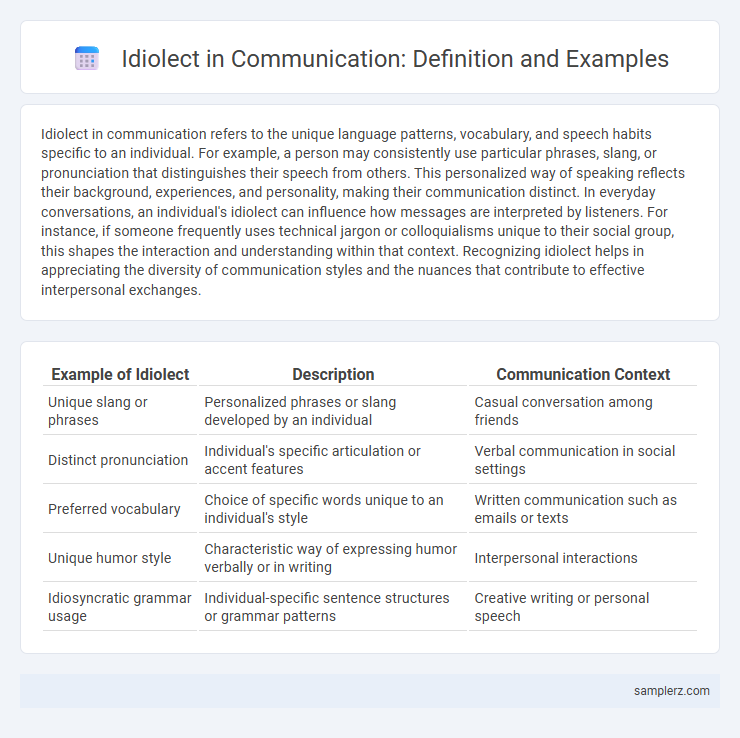Idiolect in communication refers to the unique language patterns, vocabulary, and speech habits specific to an individual. For example, a person may consistently use particular phrases, slang, or pronunciation that distinguishes their speech from others. This personalized way of speaking reflects their background, experiences, and personality, making their communication distinct. In everyday conversations, an individual's idiolect can influence how messages are interpreted by listeners. For instance, if someone frequently uses technical jargon or colloquialisms unique to their social group, this shapes the interaction and understanding within that context. Recognizing idiolect helps in appreciating the diversity of communication styles and the nuances that contribute to effective interpersonal exchanges.
Table of Comparison
| Example of Idiolect | Description | Communication Context |
|---|---|---|
| Unique slang or phrases | Personalized phrases or slang developed by an individual | Casual conversation among friends |
| Distinct pronunciation | Individual's specific articulation or accent features | Verbal communication in social settings |
| Preferred vocabulary | Choice of specific words unique to an individual's style | Written communication such as emails or texts |
| Unique humor style | Characteristic way of expressing humor verbally or in writing | Interpersonal interactions |
| Idiosyncratic grammar usage | Individual-specific sentence structures or grammar patterns | Creative writing or personal speech |
Understanding Idiolect: A Unique Personal Language
Idiolect in communication refers to the distinctive language style and vocabulary unique to an individual, shaped by personal experiences, culture, and social interactions. This personalized mode of expression influences how messages are encoded and decoded, affecting clarity and interpersonal understanding. Analyzing idiolect helps decode subtle nuances in communication, revealing insights into identity and cognitive processes.
The Role of Idiolect in Everyday Communication
Idiolect shapes individual communication by reflecting unique vocabulary, pronunciation, and usage patterns that distinguish one speaker from another. This personalized linguistic style influences how messages are interpreted and understood in daily interactions, enhancing clarity or causing misunderstandings. Awareness of idiolect helps improve effective communication by acknowledging and adapting to these personal language variations.
Common Features of Idiolect in Speech
Idiolect in communication is characterized by unique vocabulary choices, distinctive pronunciation patterns, and individual syntactic structures that reflect a speaker's personal linguistic habits. Common features include the use of particular slang, preferred sentence constructions, and consistent intonation styles that differentiate one person's speech from another. These idiosyncratic elements contribute to the speaker's identifiable linguistic fingerprint within social interactions.
Idiolect Examples in Family Conversations
Family conversations often showcase idiolects through unique phrases, tone, and vocabulary developed over time among members, such as a parent's distinctive way of giving instructions or a child's personalized nicknames for relatives. These idiolectal traits enhance bonding by embedding shared meanings and emotional nuances exclusive to the family unit. Recognizing idiolect examples in family dialogues helps linguists understand how individual language variations evolve within intimate social groups.
Idiolect in Professional and Workplace Interactions
Idiolect in professional and workplace interactions shapes unique communication styles, reflecting individual vocabulary, tone, and jargon linked to specific roles or industries. For example, a software developer may use specialized coding terms and technical phrases that differ from a marketing specialist's idiolect, which includes persuasive language and consumer-focused terminology. Recognizing and adapting to colleagues' idiolects enhances clarity and collaboration in team settings.
How Culture Shapes Individual Idiolects
Culture significantly influences individual idiolects by embedding unique lexical choices, idioms, and speech patterns reflective of specific social groups or regions. For instance, a person's use of culturally rooted expressions or code-switching habits demonstrates how cultural background shapes their personalized mode of communication. This cultural imprint on idiolect enhances both identity expression and interpersonal understanding within diverse communities.
Idiolect Differences Among Friends and Peers
Idiolect differences among friends and peers manifest through unique vocabulary, slang, and verbal habits shaped by shared experiences and social environments. These personalized language patterns foster group identity, strengthen social bonds, and influence communication dynamics within peer circles. Understanding individual idiolects aids in interpreting nuanced meanings and enhancing interpersonal interactions.
Famous Personalities and Their Distinct Idiolects
Famous personalities often exhibit unique idiolects that shape their public communication, such as Shakespeare's inventive vocabulary and distinctive wordplay that define Early Modern English literature. President Barack Obama's measured cadence and carefully chosen rhetoric exemplify a formal yet relatable idiolect influencing political discourse. Elon Musk's idiolect incorporates technical jargon and futuristic terminology, reflecting his innovative persona in technology and communication.
Recognizing Idiolect in Digital Communication
Idiolect in digital communication manifests through unique vocabulary, punctuation styles, and emoji usage that individuals consistently apply across social media, emails, and texting platforms. Recognizing these distinct linguistic patterns helps in identifying authorship and understanding personal communication styles within digital contexts. Analyzing idiolect enhances digital forensic linguistics and improves natural language processing algorithms in personalized communication tools.
The Impact of Idiolect on Effective Communication
Idiolect significantly influences effective communication by shaping the unique vocabulary, pronunciation, and grammar patterns an individual uses, which can either facilitate clarity or create misunderstandings. Personalized speech patterns reflect cultural background, education, and experiences, thus affecting how messages are interpreted by listeners. Recognizing and adapting to diverse idiolects enhances mutual understanding and reduces communication barriers in interpersonal and professional interactions.

example of idiolect in communication Infographic
 samplerz.com
samplerz.com